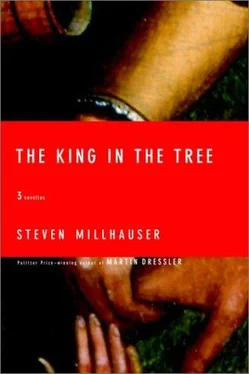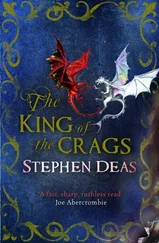A recent escapade continued to disturb him. He had passed a brilliantly successful night, making separate assignations with the handsome wife of a spice merchant and her beautiful daughter, and ravishing each of them an hour apart in his private gondola, which had been fitted with a small cabin hung with blood-red curtains. He had then followed a dark, narrow canal that led to an unfamiliar part of the city, where he climbed a flight of watery steps to a maze of high chambers and marble stairways rising to the third-floor bedroom of a silk draper’s wife. She awaited him in her curtained bed with an anxious face and a transparent nightgown. In the candlelight her dark-ringed nipples resembled the open mouths and thrust-out tongues of a pair of gargoyles he had glimpsed that morning as he glided past a church. She protested that the hour was late, that her husband would return at any moment, that she was a respectable woman, the mother of a beautiful little boy; Don Juan disrobed without answering her chatter, and her protests had changed to cries of pleasure when there was a sound of heavy footsteps on the stairs. Don Juan considered remaining on top of the wife and killing the husband when he drew aside the curtain. He changed his mind and began to dress without haste as the footsteps grew closer. He had just fastened his sword belt and placed his great hat on his head when the door handle began to turn. Juan removed his hat and bowed to his inamorata, sweeping his plumes across the stone floor. As the door burst open to reveal the silk merchant wearing the mask of a weeping clown, Don Juan turned to the man and bowed again, a long, slow, insolently calm bow, then sprang to the window. It was a warm night — a good night for a swim. The weeping clown drew his sword, shouted “Thief! Murderer!” and rushed forward as Juan leaped from the window. As he plunged through the night air toward the canal, where his gondolier waited some twenty feet away, Don Juan saw everything very distinctly: he saw an orange peel floating on the moonlit black water, he saw a blue satin slipper on a stone step lapped by ripples, he saw, in a window across the canal, a figure in the mask of a haughty queen fondling the naked breast of a woman in the mask of a grimacing monkey, and at the same time he saw, in his mind, the merchant’s wife with her eyes widening in terror, a vein in the neck of the silk merchant as he came into the glow of the candle, the big sapphire glittering on his finger, and he saw himself, falling as if slowly through the night, holding on to his plumed hat with one hand — and it seemed to him that he had seen these images before, and that he was nothing but a third-rate actor in a provincial troupe traveling from small town to small town with a play called Don Juan Tenorio —and a sorrow came over him as he understood that he had finished with Venice, that he must change his life.
Like many men who prey on women, Don Juan had occasional fantasies of a different life. Sometimes he imagined himself a stern, pale scholar bent over a volume of Aristotle in his library, while the brilliant blue light coming through the tall windows changed to plum blue to dove gray to black. At other times he was a humble monk, hoeing a row of peas in the monastery garden. These idle fancies lasted no longer than the next sight of a pretty girl — or an ugly girl with an interesting walk. Don Juan had no illusions about his nature: he craved pleasure, intense pleasure, and the most extreme of all pleasures was to be found in the bodies of women. If he felt a darkness lying across his life, a dissatisfaction deep in his blood, it was because he had become aware of a slight diminution, a lack of zest. It might be true that the women of Venice were a little too willing to be debauched, but it was also true that the most fastidious women had always proved Venetian in the end. And if they did not, and his blood was up, he asked no permission and never looked back. No, what he needed wasn’t a different life, but a more intense version of this one — a life of sensual pleasure uncorrupted by vague dissatisfactions and elusive ennuis. What he longed for was more desire, a madness of desire, a journey into feeling so intense that he would ride through himself like a conqueror of unknown inner countries. He had perhaps become a little stale. And as he lay in the darkness of his curtained bed, with his arms crossed over his chest and his eyes closed, like the stone effigy of a king, Don Juan tried to see the new life that he knew awaited him, if only he could learn to see in his own dark.
One night an idea came to him, at first vaguely, then with startling precision. He would leave the south, the lush, soft Mediterranean world where women ripened in the sun like oranges hanging over a whitewashed wall, and he would travel north. Don Juan was a child of Seville, who had always loved the cities of southern Spain and France and Italy; he had never been farther north than Paris. He would go farther than that— he would go all the way to England. England! — that legendary land composed entirely of fog, through which glimmered the crowns of stern kings. It was a land of blond-haired seamen in their high-prowed ships — or was he confusing it with Norway? But precisely what he liked about England was that he didn’t know how to imagine the place; it was an insubstantial land, a cloudland in which he seemed to see pale-haired queens walking in dim gardens. In fact he had met a number of Englishmen on his travels and enjoyed several of their wives, but somehow those very substantial creatures — the broad-shouldered wine merchant traveling in Verona, the hawk-nosed viscount with disdainful eyes who had proved to have a passion for Roman ruins and thirteen-year-old boys, the buxom, lusty wife of an apothecary who had sung him an old song of which he’d understood only the word “never” but which had disturbed him with its melancholy beauty — all these flesh-and-blood emissaries of England seemed to have nothing to do with that mythical northern land of kings and castles and pale princesses gazing down from high towers.
He had forgotten the invitation, but it came back to him now: the odd, likable traveler he had met one night at the beginning of his stay in Venice. Don Juan had been gliding along in his gondola at three in the morning, when he’d seen a strange sight: a man standing in a gondola staring up at the sky through a telescope mounted on a three-legged support. Don Juan had drawn up alongside him and addressed him in Italian, which he knew perfectly, and the man had replied in an equally fluent Italian colored by a faint accent impossible to place. He had, he said, been looking at the moon. Don Juan’s interest was aroused; the man proved amicable, and soon the two were drifting about in Don Juan’s gondola, while the man showed him the wonders of the universe. His name was Augustus Hood. He was traveling through Italy with his wife and her sister. He was one of those round-faced, plump-cheeked Englishmen who seem boyish at thirty, with a small mouth and very wide eyes, as if life for him were a perpetual surprise. Within ten minutes he had impressed Don Juan with his flow of easy erudition, his knowledge of a hundred curious subjects such as the manufacture of cannon and the methods of irrigation under the pharaohs, his travels to China, Egypt, and Constantinople, his modesty, his energy, his unlikely mixture of man-of-the-world and earnest schoolboy. He asked Don Juan questions he had never been asked before — about the manufacture of Seville lace, the shearing of merino sheep, the arrangement of rooms in his childhood home. He was leaving Venice the next day, on his way to Rome and perhaps Sicily. He would return to England in a month or so; he invited Don Juan to visit him at Swan Park in Somerset. His most recent passion was landscape gardening, and he would like to show his new friend a few little things he had accomplished in that line. The Englishman had stayed with him in the gondola until dawn, betraying no sign of tiredness, and though Don Juan had quickly forgotten Augustus Hood and his telescope, he remembered everything now in immense detail. He would go to England. He would visit Swan Park, in the mist-filled shadowy North. He might stay a week or a century. He would keep his rented palazzo on the Grand Canal, leaving behind all his servants but one. It was crucial that he take with him as little as possible of his former life.
Читать дальше












